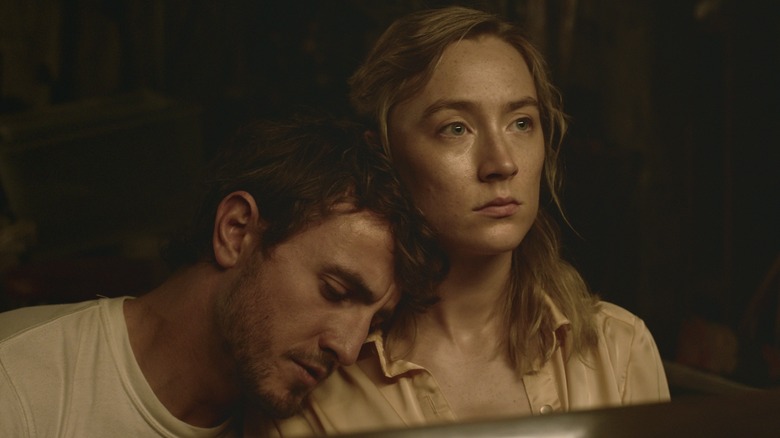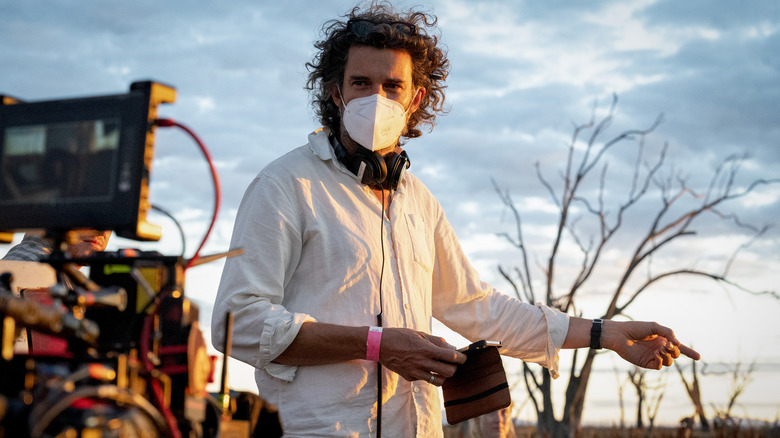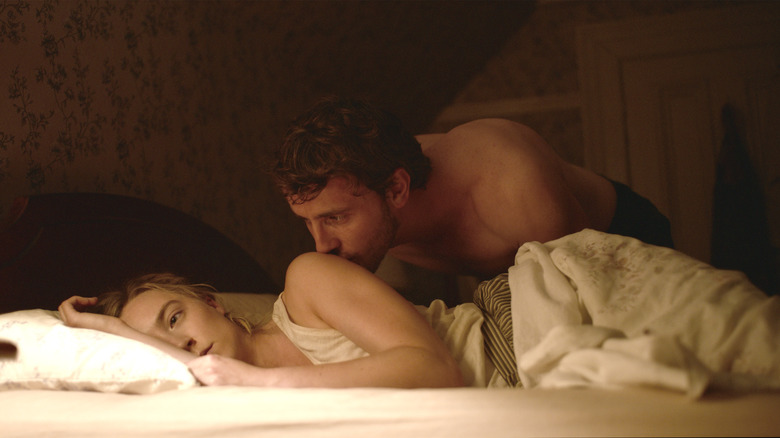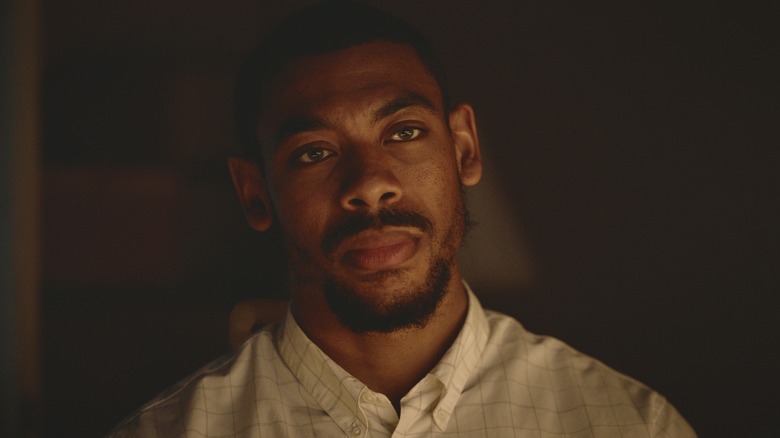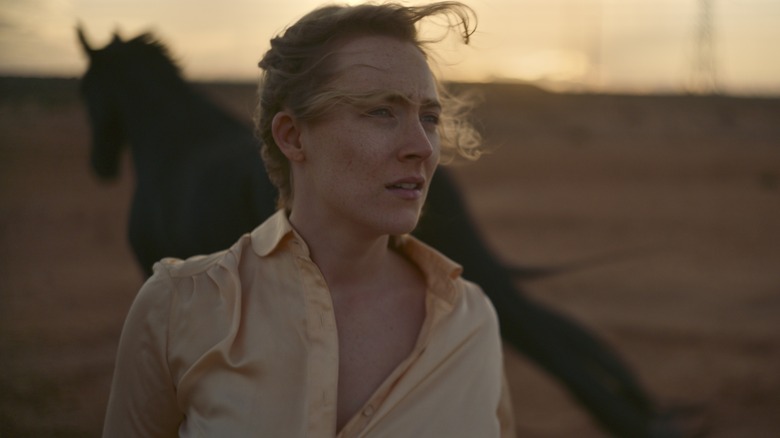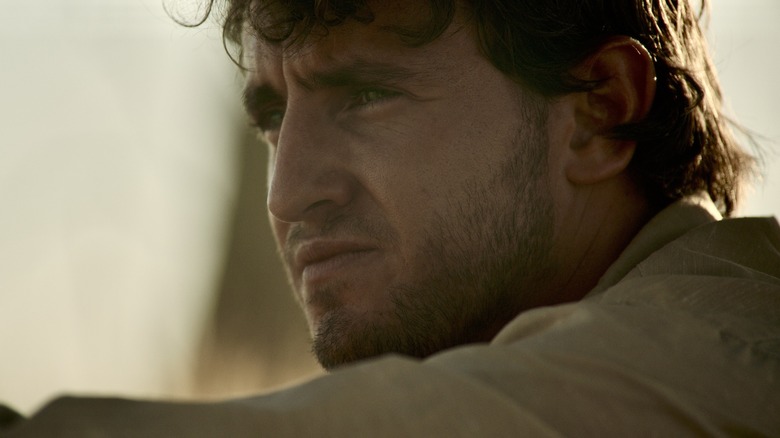Foe Director Garth Davis On Finding The Film In The Edit And The Movie's Biggest Idea [Exclusive Interview]
This post contains spoilers for "Foe."
Director Garth Davis makes "no apologies" for the fact that his new movie, "Foe," keeps the audience largely in the dark for much of its runtime.
"This is not a movie to sit back and go to sleep," he told me in an interview earlier this week. "I mean, this is a movie that asks you to be engaged. You are investigating, trying to figure out what's happening. It's asking a lot of you, but that's the point of the movie."
The futuristic science fiction film follows a young couple, Hen (Saoirse Ronan) and Junior (Paul Mescal), whose frayed marriage is shredded even further when a stranger (Aaron Pierre) arrives on their doorstep and drops a metaphorical bomb that upends their lives. With Earth rapidly dying, Junior has been conscripted to live on a space station for two years, and he's not allowed to bring Hen with him. But there's something else going on — something the audience isn't privy to until much later in the story. When that reveal finally arrives, it allows us to recontextualize what we've previously seen, turning the tale from impenetrable into ... well, something else. If I'm being overly vague, that's in keeping with the film's illusory quality, where scenes and interactions slip through your fingers as if you can't quite grab hold of them.
Davis seemed excited to talk about that storytelling choice, as well as what it was like to collaborate with co-writer Iain Reid (on whose novel the film is based), modulate the balance between keeping the audience perplexed but engrossed, and work with this cast of mega-talented actors.
Note: This interview has been lightly edited for clarity and brevity.
'Look, I know this is a bit of a crazy idea...'
This is the first time you've been credited as a writer on one of your films. What was the process like of working with Iain to write this screenplay?
It wasn't something that we planned to do. We were definitely planning to go out to screenwriters, but all the ones we wanted to work with were unavailable for like a year, or a year and a half. So in the meantime, he and I just got into the room because I was really keen to meet him, obviously, and I had a lot of questions about the novel.
So we just page-turned the novel together for a couple of days, and what we suddenly realized is that we were highlighting all the same paragraphs, picking out all the same moments, and we were just so aligned with our passion for the story and also what it could be as a movie. We also realized that we both brought ... we had such different qualities that when you brought it together, it just felt like the flavor of the movie. It felt very exciting to us, something very fresh and unique. So we came out of that and kind of walked back into [producer] Kerry [Kohansky-Roberts]' office and said, "Look, I know this is a bit of a crazy idea, but we're thinking we should have a crack at the script. If you give us a crack and you don't like it, [we] understand, but we would really love to have a crack at this." And that's how it started.
You mentioned bringing different things to the process. Can you talk a little more about that? Tell me what you brought to it and what Iain brought to it.
Well, I guess ... I don't want to, I guess, reduce us down to elements, but I think there's a lot of similarities. I think we feel and see the world in very similar ways, but he's a great philosophical master and a great believer in telling unusual stories and structuring things like that. And I guess I'm just really interested in those kind of visceral, alive relationships. So bringing those two together was really great. I mean, you've got scenes that feel very Hitchcockian and haunted and precise, and then you've got these kind of real, raw, kind of brave, crazy performances as well. So I guess that's the dance. We both love both of those things, and you can kind of feel that personality coming through, that combined personality.
'It's asking a lot of you, but that's the point of the movie'
I'm going to hold this interview until after the movie comes out because I want to talk about some spoiler stuff with you. The thing I'm most curious about in this entire process for you is striking the balance between keeping the audience in the dark about what's really going on, and then also keeping them engaged with the story until that reveal happens late in the film. How did you approach that?
Yeah, I mean, that was probably one of the most exciting aspects of doing the job, and also the most challenging. Even in the book, it was the same way. The real mystery is the relationship. I mean, there's lots of mysteries, but the real mystery is what the heck is going on in this relationship and why is Hen so hot and cold?
I guess it's a very unusual film because you can't really align with the main character, Hen, because you're not let in. You don't know all the secrets yet. So that was both exciting, but also we understood that audiences have a tolerance level. So through the editing, we think we've found the sweet spot where the audience is challenged. They have to engage in this movie. This is not a movie to sit back and go to sleep. I mean, this is a movie that asks you to be engaged. You are investigating, trying to figure out what's happening. It's asking a lot of you, but that's the point of the movie. So I guess, yeah, there's no apologies for it and we absolutely love it. But yeah, we did do some tests through the editing process with audiences to see how they were going and whether it was too much. So there were points where we had to really change things and just finesse — it was tuning it.
What was that process like for you, finding that in the edit? Was it frustrating, or were you able to take a step back and look at the thing and diagnose these issues?
The reality is that I can't pretend to know what a first time viewing of this movie's like, because I know the story. So in a way, I can do my best guess, but the real proof is in front of people who've never seen it before. So we were mostly keen to get in front of people that knew nothing about it. And the editor and I, we'd be watching that like a hawk, and we'd ask lots of questions. We knew the story we wanted to tell. We knew where we wanted to hold course, but if people weren't understanding what we thought we were getting across, then they were the things we would start to address. We weren't there to kind of please people. We were there to make sure that we were getting across the intention of the film.
'I didn't take that character for granted'
Shifting gears a little, even though Terrance is a supporting character, he has to be the sort of voice of authority here and both the characters and the audience look to him to tell us what's going to happen next, in a way. Tell me about working with Aaron and shaping that role with him.
Yeah, look, I mean, he was the hardest character to ... I didn't take that character for granted. He needed to have a lot of complexity and not fall into those kind of stereotypical antagonists. So ... what a great challenge. How do you find a believable truth behind a character that's doing these kind of things? And how can the provocations not feel cruel, but feel somehow he's trying to ... he really believes that he's improving humanity. And all these, what feel like cruel provocations to Junior, are actually him trying to loosen the rigidity of what he's become. Why have you become this person? Do you really think you know your wife?
So on a first viewing, you think this is kind of a cruel thing, but actually when you reflect back, in a way he was trying to help Hen, he was trying to see what he could do with it. So I guess because of the depth of the script and the depth of the truths of the world, that just gave the actors, gave all the material, it just gave them all those springboards to get into that really rich place of performance.
The other thing I was really curious about was almost feeling this father-son quality with Junior and tapping into something very human there, which I thought brought a lot of dimension to Terrance. And in a way, there's an aspect that he plays God as well. So there's something very metaphysical and cerebral as well. So yeah, hopefully that comes across, but it's all in there.
Through this sci-fi premise, the story engages with these really big ideas about how people change over time and how relationships evolve and how people fall in and out of love. I'm curious if there was one theme or one idea that you really connected to, that most helped you convince yourself that you needed to make this your next movie. Was there one main idea?
It's very simple to me, and I just feel like I've said this a few times now, but I just feel like society is asleep at the wheel and we've forgotten who we are. We've forgotten our inner nature. We've forgotten who we are. And I guess Hen represents probably the next generation screaming at us to change, to pay attention, and to not forget that we are precious. This time in our life, don't take it for granted. And not just ourselves, but the people around us. We are nature ourselves, and every action, word, is sacred, and it has an effect on nature itself. There's no surprise we're in a mess right now. It's because of us. I really align with Hen and what she's fighting for. And a lot of people, they just want to be numbed out and not think, which is fine. I mean, that's very pleasurable. But at some point, do you want to go deeper?
'She really wanted to put words in Hen's mouth about the environment'
Saoirse and Paul are incredible in this, especially given that, speaking for me and probably for a lot of other audiences, I didn't really know what was going on for the first hour-plus of the movie. But thinking back to the intensity of their performances after you know what's happening, you're able to recontextualize all these little moments. Tell me about working with them, what their reaction was the first time to reading the script, and what kind of conversations you had early on.
Probably similar to you. I mean, I think they just had to, when they got to the end and understood everything, that's when they got very excited. Because I mean, in a way, they were probably just — I think from memory — they were just caught up in the mystery of trying to work out what the hell's going on. But when they got all the resolution, they go, "Okay, this is actually ... [these are] very deep, complex, really rich, complex characters to play." So I think they just saw the potential and the challenge of the layers they had to bring to the performances, and that's what really drew me to it as well. I love working with actors, and this was just a really fun thing to explore.
Did Saoirse have anything that she wanted to tweak in the script to help feel like she could own the character?
[A]ll actors will definitely maybe raise a question if it doesn't feel truthful. That's the great thing working with actors, is you, in a way, maybe find a couple of cracks in the scripts that maybe some of the choices — where are those choices coming from? So it's really, that process is very helpful and important. I think the one thing she did actually mention was she really wanted to put words in Hen's mouth about the environment, about [how] she feels very strongly that we have taken from the Earth, not shared with the Earth, respected the Earth. So some of those lines in the movie are literally, Saoirse really put those words into Hen's mouth.
'I thought for a moment he was literally going mad'
Tell me about filming in a chicken factory. You mentioned the word "visceral" earlier, and that imagery, it just immediately conjures a feeling in the audience. What was the experience like to actually film a place like that?
I guess the chicken factory is a great metaphor for how we're asleep. We just go and get a chicken at a restaurant and it's all packaged, and we've lost a sense of the reality of where things come from. So yeah, going to that chicken factory, ... it just wakes you up. It's confronting, and we are taking lives to consume. I don't have a judgment on that. It's just when you show the images, it just brings the reality to you and our responsibility to it. It was very confronting. It was very confronting going into that environment. Every single person, meat lovers, not meat lovers, I think were all kind of questioning who they were after that visit.
When you think back to the experience of making this movie, is there something that stands out that you're the most proud of?
To be honest, I'm proud of all of it. But I guess just my own personal taste. I definitely love Paul's speech about the darkness of humanity, the ugliness of humanity — that's an extraordinary performance. And it was a moment, it happens every now and then, where you just leave your body in the room when you're watching it. It feels like he was doing something very, very unique. There was nowhere to hide in that scene. And I mean, what a beautiful, extraordinary, painful, deeply felt performance, and reverberating — it was just f***ing fearless. It was amazing. So yeah ... what can I say? That was just beautiful. And when he was in the bathtub afterwards, that ... pain was real. I thought for a moment he was literally going mad. I mean, extraordinary. And that was a Paul that I hadn't seen. That was just a whole other layer.
Saoirse, she's just got this incredible effervescence and this lightness and a playfulness. It's so exciting. I guess the moment that was the most experimental was where she's pulling the face at the tree. That idea of trying to find — well, everyone can interpret it their own way, but this idea of not feeling like you're in your skin, you've lost a sense of who you are. There was no real prescription on how to do that. So finding the primality of that was very exciting for Saoirse, because that's something that I hadn't seen her do either. I think those two moments for me was where I saw the actors go somewhere I hadn't seen them go, and that's where I felt very excited.
"Foe" is in theaters now.
